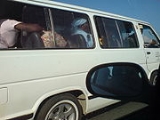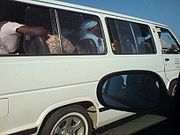
Taxi wars in South Africa
Encyclopedia
 |
|
| People using Taxi service each day | 14 million |
| Officially registered minibus taxis | 120,000 |
| Average taxis per owner | 2 |
| Avg monthly kilometers driven by a taxi | 8,000 |
| Avg number of passengers transported monthly per vehicle | 3,161 |
| Avg time spent daily in a taxi by a passenger | 65 min |
| Avg number of trips per passenger per day | 2.3 |
| Data as of 2006 | |
The term taxi war is usually used to refer to the turf war
Turf war
According to Wordnet the definition of a turf war is "a bitter struggle for territory or power or control or rights". For example: a turf war erupted between street gangs; the president's resignation was the result of a turf war with the board of directors. In larger companies Turf wars could...
s fought between taxi associations and individual minibus taxi drivers in South Africa
South Africa
The Republic of South Africa is a country in southern Africa. Located at the southern tip of Africa, it is divided into nine provinces, with of coastline on the Atlantic and Indian oceans...
, from the late 1980s onwards. These taxi wars are still raging to the present day.
The multi-billion rand
South African rand
The rand is the currency of South Africa. It takes its name from the Witwatersrand , the ridge upon which Johannesburg is built and where most of South Africa's gold deposits were found. The rand has the symbol "R" and is subdivided into 100 cents, symbol "c"...
minibus taxi industry carries over 60% of South Africa's commuters. Generally speaking, these commuters are all of the lower economic class. Wealthy individuals drive their own car for safety and convenience and would never consider riding in the minibuses. The industry is almost entirely made up of 16-seater commuter kombi
Volkswagen Type 2
The Volkswagen Type 2, officially known as the Transporter or Kombi informally as Bus or Camper , was a panel van introduced in 1950 by German automaker Volkswagen as its second car model – following and initially deriving from Volkswagen's first model, the Type 1 , it was given the factory...
buses which are sometimes unsafe or not roadworthy. Minibus taxi drivers are well known for their disregard for the road rules and their proclivity for dangerously overloading their vehicles with passengers.
Due to an effectively unregulated
Deregulation
Deregulation is the removal or simplification of government rules and regulations that constrain the operation of market forces.Deregulation is the removal or simplification of government rules and regulations that constrain the operation of market forces.Deregulation is the removal or...
market and the fierceness of competition for passengers and lucrative routes, taxi operators band together to form local and national associations. These associations soon exhibited mafia
Mafia
The Mafia is a criminal syndicate that emerged in the mid-nineteenth century in Sicily, Italy. It is a loose association of criminal groups that share a common organizational structure and code of conduct, and whose common enterprise is protection racketeering...
-like tactics, including the hiring of hit-men and all-out gang warfare. These associations also engaged in anti-competitive price fixing
Price fixing
Price fixing is an agreement between participants on the same side in a market to buy or sell a product, service, or commodity only at a fixed price, or maintain the market conditions such that the price is maintained at a given level by controlling supply and demand...
.
Causes
Prior to 1987, the taxi industry was highly regulated and controlled, with Black taxi operators declined permits. 16-seater minibuses were illegal to operate as taxis. Post 1987, the industry was rapidly deregulated, leading to an influx of new minibus taxi operators, keen to make money off the high demand for this service. Because the industry was largely unregulated and the official regulating bodies so corrupt, the industry quickly became criminal in nature.The economic drivers for the wars were intertwined with political unrest around the time of the fall of apartheid in 1994. Commuters were often the target of political violence not necessarily related to the taxi industry itself. Often, the warring factions involved were from opposing political parties such as the IFP
IFP
IFP can stand for:* International Federation of Poker* Interwise Food Portal* Independent Feature Project* "The Illinois Functional Programming Interpreter", A.D. Robison, Proc 1987 SIGPLAN Conf on Interpreters and Interpretive Techniques , pp...
and ANC
African National Congress
The African National Congress is South Africa's governing Africanist political party, supported by its tripartite alliance with the Congress of South African Trade Unions and the South African Communist Party , since the establishment of non-racial democracy in April 1994. It defines itself as a...
. In the years leading up to the abolition of apartheid, the government is believed to have actively encouraged this violence so as to destabilize its political opposition. For example, in 1998, 13 police officers were charged with complicity in taxi violence.
Pre 1977 (State owned monopoly)
The Motor Carrier Transportation Act of 1930 prohibited transportation of goods / passengers by road for profit without a permit from the Local Road Transportation Board (LRTB). The transport industry was essentially a state monopoly held by the South African Transport Service (SATS).Taxi owners operating outside the jurisdiction of the LRTB were operating illegally. These taxi operators started banding together into local informal associations.
1977-1987 (Impetus towards deregulation)
Along with growing political pressure, the Soweto RiotsSoweto riots
The Soweto Uprising, also known as June 16, was a series of high school student-led protests in South Africa that began on the morning of June 16, 1976. Students from numerous Sowetan schools began to protest in the streets of Soweto, in response to the introduction of Afrikaans as the medium of...
of 1976 prompted the then National Party government to form a commission of inquiry into the transport industry. In 1977, the Van Breda Commission of Inquiry recommended freer competition and less regulation in the industry. The commission realized that the transport industry was becoming highly politicized and that it was no longer in the government's best interests to participate in the transport market.
In 1979, the first national association of black taxi drivers was established: The South African Black Taxi Association (SABTA). In the years to come, rival organizations such as South African Long Distance Taxi Association (SALDTA) would be formed. This body, along with other political bodies at the time, started putting pressure on government to deregulate the industry. Impetus towards a free-market economy grew stronger in the late 80's.
1987-1994 (Deregulation)
The White Paper on Transport Policy, tabled in January 1987, in conjunction with the Transport Deregulation Act of 1988 effectively deregulated the entire taxi industry overnight. Significantly, making minibus taxis legal. This change gave birth to the taxi industry as it exists in its current form. The permit issuing process was rife with corruption, permits were essentially given away to favoured applicants. For all intents and purposes, there was no control whatsoever.In the absence of official controls, the now growing taxi organizations started to flex their muscles, using their influence to make more money, to intimidate the opposition. The authorities did little or nothing to stop the violence.
1994-1999 (Post apartheid)
In contrast to expectations, the violence intensified after the fall of apartheid.In 1995, the government established the National Taxi Task Team (NTTT) to arrive at a solution to the taxi violence. In 1996 the NTTT's first report recommended the immediate re-regulation of the taxi industry.
The government's attempts at re-regulation were actively resisted by the now extremely powerful "mother" organizations which controlled the taxi industry, this led to an escalation of violence between 1998 and 1999.
1999-Present (Recapitalisation)
The government intended The National Land Transport Transition Act, Act No 22 of 2000 to help formalise and re-regulate the now out-of-control taxi industry. Along with new legislation, the government instituted a 4 year re-capitalisation scheme in the same year. The intention of this scheme was to replace the 15-seater minibuses with 18 and 35-seater minibuses. There have been a number of delays in this process. Firstly, the government has been waiting for the taxi industry to form one cohesive association that can speak on behalf of taxi owners, secondly, there is a lot of disagreement from taxi owners as to the nature that the re-capitalisation scheme should take.One major sticking point is the possibility of job losses caused by the uptake of the larger buses. The government attempted to do research into the extent of the prospective job losses in 2000, but the research team was threatened and research was abandoned
In 2004, the minister of transport released a revised recapitalisation timeline which was scheduled to start in 2005/6 and end 7 years later. At time of writing, the TRP had started, though was plagued by delays.
According to the Transport Department 1,400 old and unsafe taxis have been scrapped, with 80% of the taxi fleet expected to be recapitalised by the 2009/10 financial year.
Death toll
| Number of deaths | Number of injuries | |
|---|---|---|
| 1991 | 123 | 156 |
| 1992 | 184 | 293 |
| 1993 | 330 | 526 |
| 1994 | 183 | 292 |
| 1995 | 197 | 282 |
| 1996 | 243 | 331 |
| 1997 | 243 | 331 |
| 1998 | 246 | 343 |
| 1999 | 258 | 287 |
See also
- Truth and Reconciliation Commission (South Africa)
- Apartheid
- Share taxiShare taxiA share taxi is a mode of transport that falls between taxis and conventional buses. These informal vehicles for hire are found throughout the world. They are smaller than buses, and usually take passengers on a fixed or semi-fixed route without timetables, usually leaving when all seats are filled...

